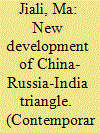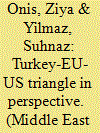| Srl | Item |
| 1 |
ID:
144659


|
|
|
|
|
| Summary/Abstract |
Japan and South Korea have had differing patterns of responding to China’s rise and
aligning with the United States. This can be explained by shifting threat perceptions
based on interactions between evolving systemic and local threats, from both China
and North Korea, as well as their relative degrees of imminence.
|
|
|
|
|
|
|
|
|
|
|
|
|
|
|
|
| 2 |
ID:
064991


|
|
|
| 3 |
ID:
169134


|
|
|
|
|
| Summary/Abstract |
Narratives about the challenges of China’s growing involvement with Central and Eastern Europe (CEE) for the region and the EU are exponentially proliferating and have already effectively monopolized the understanding of this relationship among scholars, analysts, media, and policy-makers in the Western European capitals. The Western Balkans, as a sub-region of CEE, are thought of as particularly prone to Chinese influence—the countries in this geographical area are not EU members nor are fully integrated in the EU’s policy and legislative frameworks and initiatives yet are interested in maximizing the economic benefits of their relationship with China. By strategically developing ties with the Western Balkans, China is understood to have, or is well on the way to achieve, profound impact in this region. This paper focuses on three policy areas perceived to be both the most important channels and the clearest expressions of China’s influence in the Western Balkans—foreign policy, physical infrastructure and connectivity, and investment. Using the notion of the structural power for its analytical framework, this study finds that while the attention has been on China’s growing presence in the region, the extent to which the EU has since moved to re-assert its leadership in the Balkans has gone under the radar. The paper concludes that in recent years Brussels has reformulated its agenda so as to bind the Balkan states to its own policies and objectives, constraining their ability to independently shape their relationship with Beijing.
|
|
|
|
|
|
|
|
|
|
|
|
|
|
|
|
| 4 |
ID:
052986


|
|
|
| 5 |
ID:
061704


|
|
|
|
|
| Publication |
Spring 2005.
|
| Summary/Abstract |
This article examines the delicate dynamics of the triangle of Turkey-EU-US relations. While acknowledging the role of the United States in promoting close links between Turkey and the EU, this study underlines the limits of American influence on EU decision-making on issues concerning “deep integration.” In this context, the future of this triangular relation depends on the interplay of contending forces in Turkey’s domestic political arena as well as the dynamics of trans-Atlantic relations in the international scene.
|
|
|
|
|
|
|
|
|
|
|
|
|
|
|
|